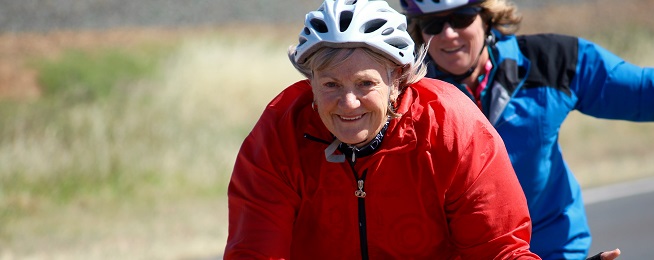Two new studies of older adults – who during their life have exercised long and hard on a bike – has found that they rolled back the ageing clock.
In a surprising finding that has made scientific headlines around the world, the studies observed that the immune system of the older bike riders had not aged: they were producing the same number of T cells as those of a young person.
Typically, an individual's thymus starts to shrink at the age of 20 and make fewer T cells. But not so with fit bike riders; their disease-fighting armoury stays battle-ready throughout life.
The researchers concluded that what was thought to be a natural decline in in the immune system due to age, is actually driven by reduced physical activity.
And the discoveries did not end there. Researchers at the Kingʼs College London and University of Birmingham reported even more evidence that riding keeps you young.
The studies showed no loss of muscle mass and strength in those who exercise regularly.
The riders did not increase their body fat or cholesterol levels with age and the men's testosterone levels also remained high, suggesting that they may have avoided most of the male menopause.
The studies recruited 125 amateur cyclists aged 55 to 79, 84 of which were male and 41 were female. The men had to be able to cycle 100 km in under 6.5 hours, while the women had to be able to cycle 60 km in 5.5 hours.
The participants underwent a series of tests in the laboratory and were compared to a group of adults who do not partake in regular physical activity. This group consisted of 75 healthy people aged 57 to 80 and 55 healthy young adults aged 20 to 36.
Professor Stephen Harridge, Director of the Centre of Human & Aerospace Physiological Sciences at Kingʼs College London, said: "The findings emphasise the fact that the cyclists do not exercise because they are healthy, but that they are healthy because they have been exercising for such a large proportion of their lives.
"Their bodies have been allowed to age optimally, free from the problems usually caused by inactivity. Remove the activity and their health would likely deteriorate.”
Norman Lazarus, Emeritus Professor at Kingʼs College London and also a master cyclist and Dr Ross Pollock, who undertook the muscle study, both agreed that: "Most of us who exercise have nowhere near the physiological capacities of elite athletes.
"We exercise mainly to enjoy ourselves. Nearly everybody can partake in an exercise that is in keeping with their own physiological capabilities.
"Find an exercise that you enjoy in whatever environment that suits you and make a habit ofphysical activity. You will reap the rewards in later life by enjoying an independent and productive old age."
Professor Janet Lord, Director of the Institute of Inflammation and Ageing at the University of Birmingham, said the findings debunk the assumption that ageing automatically makes us more frail.
"Our research means we now have strong evidence that encouraging people to commit to regular exercise throughout their lives is a viable solution to the problem that we are living longer but not healthier."
The researchers hope to continue to assess the cyclists to see if they continue to cycle and stay young.


